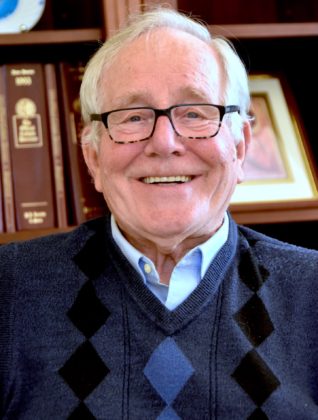“Sometimes the best that we can do is offer clarity and comfort in difficult situations, not just to the patient, but to their caregivers as well.”
-Fr. Jan de Jong, SCJ
Advances in science have produced life-changing and even life-saving medicine. However, as opportunities in medicine increase, so too do challenging questions surrounding healthcare.
Approximately 40 years ago, hospitals started to develop multidisciplinary “ethics committees” to help medical professionals, administrators, patients and families wrestle with potentially life-changing situations, including end-of-life care.
Now found in most hospitals in the United States, such committees were seen in only a handful of facilities nationwide when Fr. Jan de Jong, SCJ, was asked to be a part of one of the first in the Milwaukee area. St. Luke’s Hospital, a Level 3 Critical Care facility, began to organize its ethics committee in the 1970s.

A moral theologian by training (he has a doctorate in moral theology from the Academia Alfonsiana in Rome), in the 1970s Fr. Jan had become increasingly interested in the newly developing field of medical ethics. He was asked by St. Luke’s to represent the pastoral component of the committee. Doctors, nurses, social workers, administrators, lawyers, ethicists and others from a wide variety of disciplines were a part of the committee. At the time, Fr. Jan had been teaching moral theology at Sacred Heart Seminary and School of Theology and working with the CPE program (Clinical Pastoral Education) at St. Luke’s.
“Initially, many of the doctors were afraid of us,” said Fr. Jan of the committee. “They saw us as a sort of oversight or monitoring group; people who would judge their work.”
But the purpose of the committee was the exact opposite. Instead of judging doctors and their actions, the committee was to be of assistance to them – an advisory body to aid doctors in the midst of difficult decisions.
After several years with St. Luke’s, Fr. Jan moved to Houston where he was asked to serve on the Medical Ethics Committee at what is now known as Memorial Hermann Memorial City Medical Center. Another Level 3 Critical Care hospital, the ethics committee regularly had cases brought before it for input.
Fr. Jan’s primary task in Houston was to serve as a CPE supervisor but his interest in the field of bioethics continued to grow. He attended and eventually presented at bioethics seminars around the country.
When he returned to teaching at SHSST in 1999, Fr. Jan added a course on “Human Life” to his schedule, along with previous courses that he had taught in moral theology. He also worked with the Medical College of Wisconsin, helping medical students critically think about the care decisions that they would be expected to make. Although he was working in a secular environment, his foundation was in Catholic moral theology and SCJ spirituality.
“Working in a secular environment is indeed a challenge for a Catholic moral theologian,” said Fr. Jan. “However, most physicians will at some point attend to Catholic patients and it is good for the physician to appreciate the spiritual background of their patients. As a Catholic moral theologian with a background in medical ethics I was often consulted by physicians about ethical questions in medicine. Physicians sometimes have theological questions too. In seminars with medical students I often tried to clarify their understanding of the Catholic position regarding death and dying, last resort interventions, and similar concerns.”
Back in the Milwaukee area, Fr. Jan was once again asked to assist with several medical ethics committees, including two on which he continues to serve: the San Camillo Ethics Committee (San Camillo is a transitional living facility that offers options from assisted living to nursing care) and the Milwaukee Archdiocesan Healthcare and Bioethics Committee.
As with that first committee at St. Luke’s, both of these committees are consultative. The focus of the archdiocesan committee is set by the archbishop. The current archbishop, Fr. Jerome Listecki, is – like Fr. Jan – a trained moral theologian. He taught moral theology at Mundelein Seminary for many years.
“We have had some wonderful conversations,” said Fr. Jan about his interactions with Archbishop Listecki. Fr. Javier Bustos, a Milwaukee diocesan priest, is the archbishop’s representative on the committee. If his name is familiar, it is because Fr. Bustos has served in several roles at SHSST, including as a professor of moral theology.
One of the primary focuses of the archdiocesan committee is to ensure that the Ethical and Religious Directives of Catholic Health Care Services developed by the US Conference of Catholic Bishops are followed by hospitals and healthcare facilities in the archdiocese which identify as Catholic.
“Again, our role is not to ‘police’ medical professionals but to serve as a sounding board for the archbishop,” said Fr. Jan.
Regardless of the committee on which Fr. Jan sits, the ultimate purpose of each is the same: providing patients with the most compassionate care possible.
“And sometimes, that means simply helping patients know that God is with them,” said Fr. Jan. “God walks with us in the valley of darkness.”
“Why does God want me to suffer so much,” said a patient during the review of a complicated situation brought before an ethics committee.
“I told him ‘No, the Lord does not make us suffer, he is here to help us,’” said Fr. Jan.
“Sometimes the best that we can do is offer clarity and comfort in difficult situations, not just to the patient, but to their caregivers as well,” he added.
Fr. Jan de Jong, 81, has served as a professor of moral theology, CPE supervisor, novice master, and as SHSST president-rector. He is now retired and is a member of the Sacred Heart Community at SHML. Besides his work with the two committees noted above, he also continues service as a chaplain to Catholic patients at St. Luke’s Hospital one afternoon a week.
